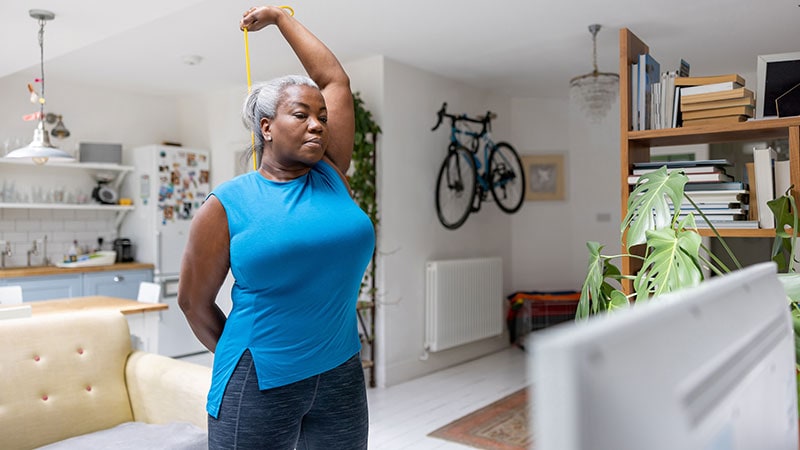TOPLINE:
Older adults with mild cognitive impairment or memory concerns increased their physical activity by an average of 65 minutes per week 6 months after completing home-based training in Tai Ji Quan compared with a stretching control group.
METHODOLOGY:
- Researchers conducted a virtual randomized clinical trial in cities, suburbs, and rural areas across 25 states; 318 participants aged 65 years or older who had mild cognitive impairment or memory concerns were included in the analysis.
- Patients were enrolled between October 2019 and June 2022. The final follow-up took place in May 2023.
- Patients were randomly assigned standard Tai Ji Quan (n = 107), cognitively enhanced Tai Ji Quan (n = 105), or stretching (n = 106), with each group participating in real-time videoconferencing sessions for 1 hour twice a week for 6 months.
- Standard Tai Ji Quan included exercises for stability, balance, and sensory integration; the cognitively enhanced version added interactive and reactive cognitive exercises with verbal and nonverbal cues.
- The primary outcome was self-reported engagement in moderate to vigorous physical activity (MVPA) in minutes per week; secondary outcomes included moderate and vigorous activity, meeting the 150 min/wk MVPA guideline as defined by Physical Activity Guidelines for Americans, and movement confidence.
TAKEAWAY:
- Both Tai Ji Quan groups showed increased MVPA compared with the stretching group at follow-up, with a mean difference of 66 min/wk for standard training (95% CI, 25-108 min/wk; P = .002) and 65 min/wk for the cognitively enhanced version (95% CI, 24-108 min/wk; P = .002).
- Patients in the standard group were 3.11 times more likely (95% CI, 1.75-5.53; P P
- The standard Tai Ji Quan group showed a mean improvement of 5 points from baseline for self-reported confidence in their movement compared with the stretching group (95% CI, 2-8 points; P = .004), and the cognitively enhanced group had a mean improvement of 7 points (95% CI, 3-10 points; P
IN PRACTICE:
“These findings suggest that Tai Ji Quan may be promoted as an avenue to achieve physical activity guidelines for older adults” with memory problems, the study authors wrote.
SOURCE:
The study was led by Fuzhong Li, PhD, of the School of Exercise and Health at Shanghai University of Sport in Shanghai, China. It was published online on December 17 in JAMA Network Open.
LIMITATIONS:
The use of self-reported physical activity measures may have been subject to recall bias and overestimation. The study sample comprised mostly White women. The 6-month follow-up period may not have been sufficient to determine behavior change in long-term physical activity. A full range of physical activity may not have been represented by the activities recorded during the trial period due to the COVID-19 pandemic.
DISCLOSURES:
One study author reported receiving grants from the National Institute on Aging as well and is the founder and owner of Exercise Alternatives, LLC. No other disclosures were reported.
This article was created using several editorial tools, including AI, as part of the process. Human editors reviewed this content before publication.
Source link : https://www.medscape.com/viewarticle/virtual-martial-arts-boosts-activity-levels-memory-impaired-2024a1000p1v?src=rss
Author :
Publish date : 2024-12-24 10:36:25
Copyright for syndicated content belongs to the linked Source.
